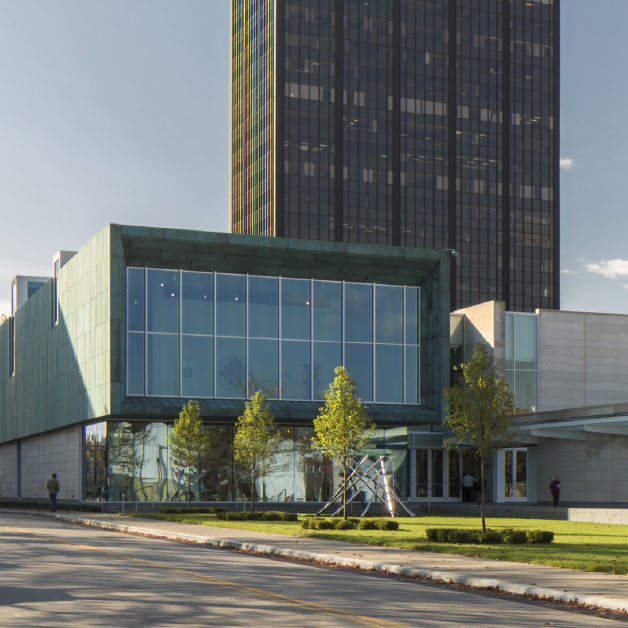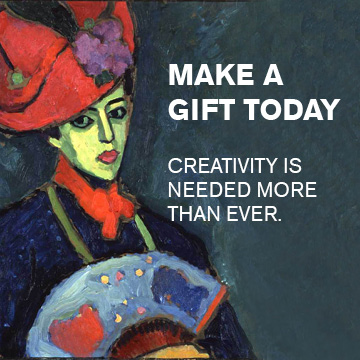Museum in Progress

Museum in Progress
The Columbus Museum of Art is on a reflective journey to better understand and address historical and on-going harm done by our museum and museums more generally. We seek to engage in this work as a “Museum in Progress.” This approach asks us to practice courage, humility, imagination, experimental processes, public engagement, and transparent self-reflection.
Museums originated as collections by the elite, for the elite. These collections promoted specific ideas and ideals, often asserting the superiority of European art, worldviews, customs and values. At the same time, this collections strategy contributed to the construction of a colonial “other,” classifying global Indigenous cultures as “non-Western,” “primitive,” exotic, and inferior. The most famous Western museums built their reputations on objects acquired through colonial theft. In the United States, museums and other institutions promoted westward expansion, ideas of “manifest destiny,” and a focus on industrial “progress” that enabled and accompanied the genocide of Indigenous peoples. Narratives of Native Americans as members of a “vanishing race” contributed to the study of supposedly “dying” cultures and prompted exploitative research and acquisitions, including of human remains and sacred objects. Museum displays and didactics continue to promote colonial attitudes and cultural hierarchies.
These truths are uncomfortable. We know that many people turn to art museums for respite and beauty and would prefer not to think about these ugly legacies. We believe that being relevant, responsive, and worthy of respect involves grappling with the complex, enduring roles of colonialism, discrimination, and privilege – and inviting our public to explore these important matters with us.
This page is intended as an evolving space to share some of the ways CMA is acting as a Museum in Progress.
Indigeneity at CMA
As part of this work, CMA staff have initiated a multi-year plan to investigate ways colonialism manifests in our museum and (re)imagine our practices to be more respectful and inclusive of Indigenous peoples and cultures. Listening to content area experts with lived experiences as Native Americans has and will continue to inform this intentional, reflective action. The current version of this plan can be viewed here.
We are deeply grateful to the Indigenous community partners who have generously shared their time and expertise as we continue learning and envisioning new, just paths forward for the institution. With special thanks to Dr. Christine Ballengee Morris and Shelly Corbin.
• Dr. Christine Ballengee Morris is Professor Emeritus from the Arts Administration, Education and Policy Department at The Ohio State University. She was the founding director of OSU’s Multicultural Center and co-leader in developing the American Indian Studies program. She has written several books, including Contemporary American Indian Art, Pedagogy, and Research with Kryssi Staikidis. Ballengee Morris’ research interests include self-determination, identity development, Indigenous arts, integrated curricula, service learning, visual culture, and arts-based research. From 1996, she has been involved with advocacy for and education about the Earthworks in Ohio.
• Shelly Corbin (Takóni Kókipešni) is creating physical and spiritual spaces that reconnect people with the land, each other and themselves. She maintains relationships with Indigenous and community leaders to share life experiences to remember, to feel, and to create memories that lead to a better future.
Decolonizing Museums
In this TEDxKingLincolnBronzeville talk, Hannah Mason-Macklin, Manager of Interpretation & Engagement, discusses decentering Western values to make museums sites of healing, connection, and progress.
A Museum in Progress: The Practice of White Accompliceship with African Exhibitions
In this article from the Journal of Cultural Research in Art Education, Dr. Melissa Crum profiles CMA’s Museum in Progress approach to the installation of cultural objects from West Africa.
Dr. Melissa Crum is an artist, author, researcher, and founder of the consulting company, Mosaic Education Network, LLC. Mosaic infuses the arts, research, storytelling, and critical thinking into professional development, community building, and curriculum development. Dr. Crum has earned degrees from The University of Florida and The Ohio State University. She is an Intercultural Development Inventory (IDI) qualified trainer and SHRM provider.
